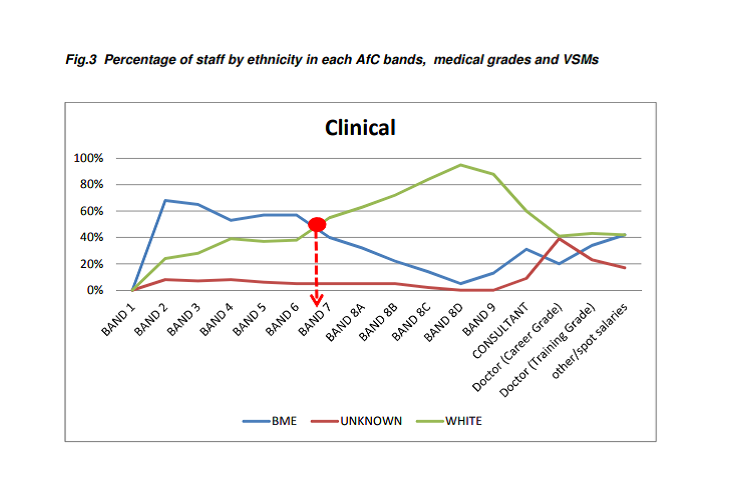Let us tackle race inequality together
Ismalia de Sousa is a clinical nurse specialist in stroke at Charing Cross Hospital. As a founding member of the BAME nursing and midwifery network at the Trust, here she reflects on the history of race equality standards in the NHS and what we can all do to bring about culture change.
Race inequality is alive across the NHS and it is here at the Trust too. Despite some improvements from last year, this year’s Annual Workforce Equality and Diversity report continues to show a steep decline in the number of clinical staff from a Black and Minority Ethnic (BAME) background in positions once you get past band 7. Of those who disclosed their ethnicity as part of this report, 47% are from a BAME background. I am one of them, and as a senior black nurse at the Trust, I feel there are steps we can all take to support equality and diversity in the workplace.
History of the race equality agenda in the NHS
Back in 2004, the Race Equality Action Plan was launched to tackle race discrimination in the NHS. Four years later, Sir David Nicholson, former NHS chief executive, called for 30% BAME representation within senior NHS management. But by 2014, little progress had been made – captured in a seminal paper by Roger Kline: ‘The “snowy white peaks” of the NHS: a survey of discrimination in governance and leadership and the potential impact on patient care in London and England. It was clear that action was needed.
In July 2015, the NHS Workforce Race Equality Standard (WRES) was introduced, requiring organisations to submit data on a number of indicators. These included factors like the relative likelihood of applicants from a white background being appointed from shortlisting compared to BAME applicants. Since 2015, yearly WRES reports have followed showing that while the ‘glacier’ has started to crack, it is still not gone.

When you look at the graph above from our latest Trust WRES report you can’t ignore the fact that band 7 is the tipping point: a level that few members from a BAME background progress beyond. On an individual level, I firmly believe we can all take proactive steps to address race inequality and accelerate culture change. Here is my five-point plan for positive change:
- Firstly, acknowledge that the problem exists and realise the impact it has on staff and also patients: research demonstrates the positive impact on clinical and staff experience, outcomes and levels of productivity when a truly inclusive, diverse and equal workforce is in place.
- Talk about race with your colleagues so it does not become a taboo. Actively listen to the personal experiences of staff from all backgrounds, even if it may look like it’s the same as yours. Ask questions, such as what is like to walk into a meeting (in my case national committee meetings of 30 people) and immediately realise that you are the only black woman “sitting at the table”.
- Nurture talent by sharing the development opportunities that arise (acting up, secondments etc) in the Trust and externally; help to drive your own department's agenda to create opportunities for all staff; offering support and more actively shaping career pathways; telling inspirational stories of others from BAME backgrounds that have pushed through the Band 7 ice sheet and are now role models for us all. In other words, make it possible so that every single one of us in this organisation has someone who looks like them with the same career aspirations and success, who they can aspire to be like - a role model.
- Take personal action. For example, the chief nursing officer Ruth May will now only sit on an interview panel if there is a colleague from a BAME background on the panel too.
- Get involved personally. We have a newly established BAME Nursing and Midwifery Network here at the Trust and the doors are open for people of all backgrounds. You can contact me (ismalia.desousa@nhs.net) or Marie Batey (m.batey@nhs.net) for information and details.
My goal is that every single one of us is comfortable talking about race and that we stop turning a blind eye and all start to take action, irrespective of our position or band. We can only make progress and move forward together. There is no other option. There is no other way to bring about equality for our workforce.
Last week our Trust board approved the workforce equality and diversity work programme for the next year (2019/20). It includes a range of initiatives designed to tackle this issue, and others highlighted in the report, such as the disproportionate representation of people from a BAME background entering formal workforce procedures. Some of the actions our Trust will take forward include:
- Introducing ethnically-mixed interview panels for the recruitment of band 7 + roles
- Developing an unconscious bias training programme, and
- Establishing a reverse mentoring programme for executive directors
Our board has pledged that we will tackle racial inequality at the Trust and create a more just and inclusive place to work. So I ask, how about you? What are you going to do?
If you are interested in joining the BAME Nursing and Midwifery Network at the Trust contact: m.batey@nhs.net.
Read the NHS WRES data analysis report which presents three years of data (2016-18) and demonstrates NHS Trusts’ progress against nine WRES indicators.
This Friday there is a staff event for the BAME Nursing and Midwivery network open to all nurses, midwives and healthcare support workers:
Date: Friday 5 April
Time: 08.30 to 12.00
Venue: W12 conference centre, Hammersmith Hospital
The event will focus on talking about the work undertaken by the network so far, the opportunities staff have to get involved, topics such as reverse mentorship and how to expand the network's membership.
To book your place, please contact Melanie Woodfield-Bailey on x21482 from a Trust landline. Email Marie Batey (m.batey@nhs.net) for more information.


